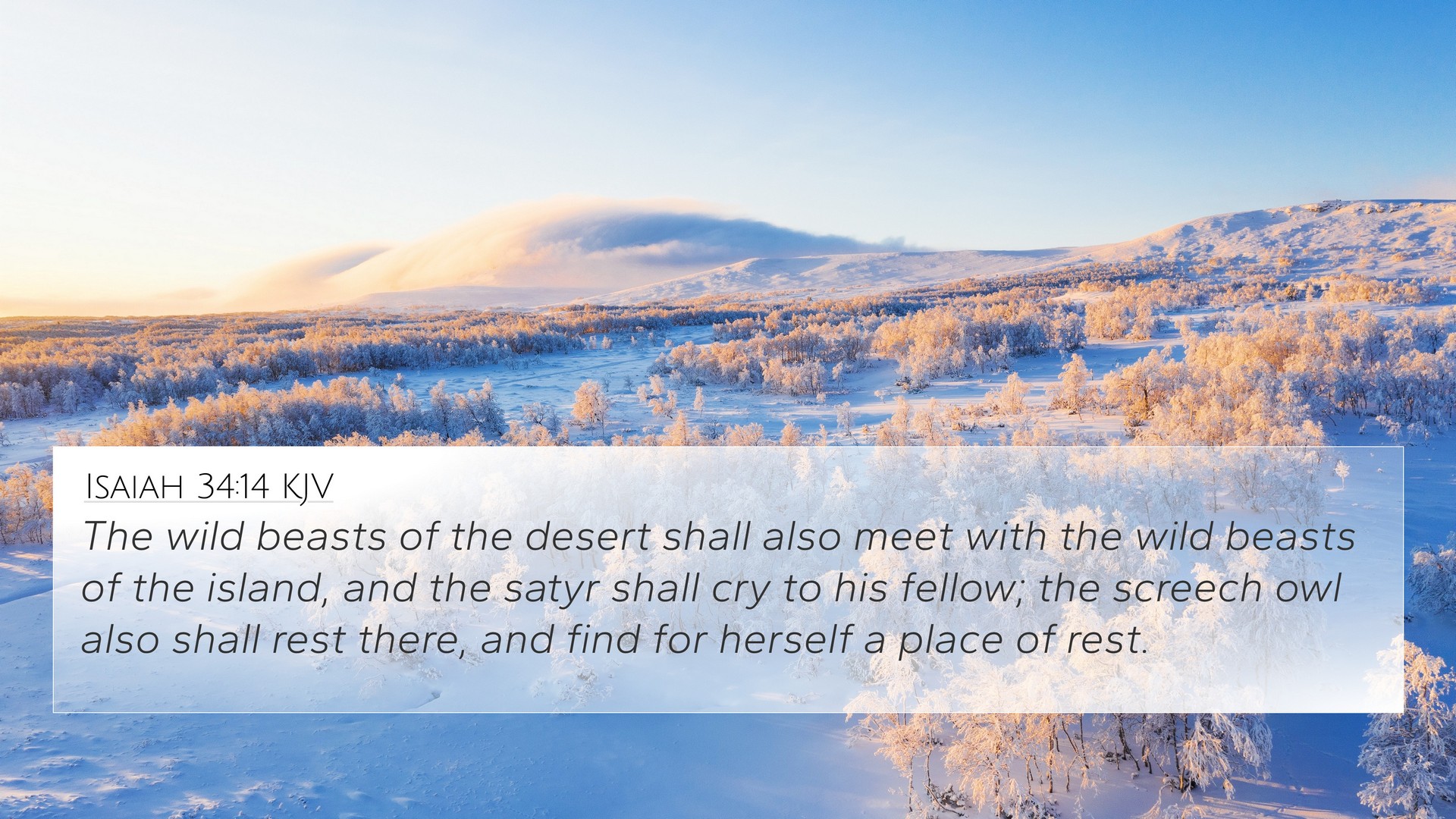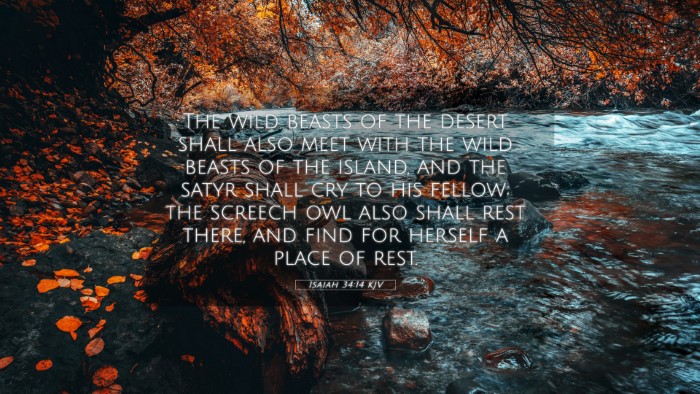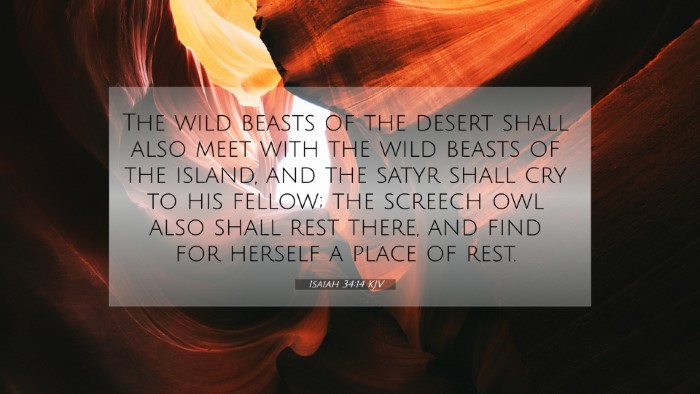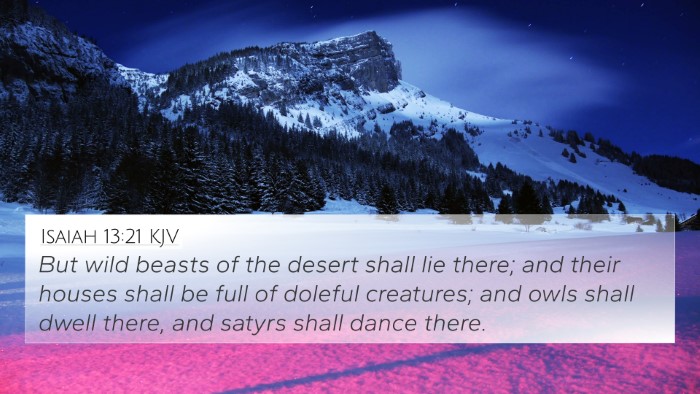Understanding Isaiah 34:14
Verse: Isaiah 34:14 - "The wild desert creatures shall meet with the wolves, and the satyr shall cry to his fellow; the screech owl also shall rest there, and find for herself a place of rest."
Summary of Meaning
This verse from Isaiah presents a vivid image of desolation and judgment as it describes a transformed wasteland where wild animals encounter each other. It signifies the abandonment of the land due to divine judgment, suggesting a deep spiritual and physical void as God’s wrath is unleashed upon the nations. The verse reflects the overall theme of God's sovereignty over creation and the consequences of sin.
Commentary Insights
Matthew Henry’s Commentary
Matthew Henry emphasizes the desolation that judgment brings. He interprets the wild animals’ presence as a sign of desolation and abandonment, symbolizing how the once prosperous land has become a haunt for unclean creatures. He notes that these creatures are emblematic of the spiritual creatures inhabiting nations that have turned from God, illustrating that the deviant and wicked will thrive in places where virtue departs.
Albert Barnes’ Notes
Albert Barnes expands on the imagery of the wild creatures meeting as an indication of the futility of earthly power against God’s sovereignty. He sees the ‘satyr’ and ‘screech owl’ as representations of a cursed land—often reflecting the kind of people who inhabit such a desolate place. In his analysis, Barnes connects the prophetic message to Israel's eventual judgment, emphasizing that God’s retribution will bring chaos, where even the fiercest of beasts will have to coexist in mourning for their lost habitat.
Adam Clarke’s Commentary
Adam Clarke identifies the types of creatures mentioned and points out their inherent characteristics, shedding light on the metaphor of spiritual desolation. Clarke suggests that the satyr, often linked to pagan idol worship, reflects the folly of those who turn away from God. He accentuates the idea of the owl finding rest highlights that the evil will find comfort in desolation while good becomes scarce, indicating a theme of moral decay and abandonment due to sin against God's commandments.
Related Bible Verses
Here are some Bible verses that relate to Isaiah 34:14, showcasing thematic connections and providing a framework for cross-referencing and deeper understanding:
- Jeremiah 9:11: "And I will make Jerusalem heaps, and a den of dragons; and I will make the cities of Judah desolate, without an inhabitant." - Emphasizes destruction and desolation similar to Isaiah 34:14.
- Revelation 18:2: "And he cried mightily with a strong voice, saying, Babylon the great is fallen, is fallen, and is become the habitation of devils, and the hold of every foul spirit..." - Reflects a similar judgment and a transformation of a place from liveliness to desolation.
- Zephaniah 2:13: "And he will stretch out his hand against the north, and destroy Assyria; and will make Nineveh a desolation..." - A direct connect with the theme of nations facing divine judgment.
- Isaiah 13:21: "But wild beasts of the desert shall lie there; and their houses shall be full of doleful creatures; and owls shall dwell there, and satyrs shall dance there." - Strong parallels to the desolate imagery of Isaiah 34:14.
- Job 30:29: "I am a brother to dragons, and a companion to owls." - Reflects a kindred connection among sorrowful creatures, mirroring isolation and desolation.
- Micah 1:8: "Therefore I will make a wailing like the dragons, and mourning as the owls..." - Additional insight into the theme of mourning and desolation.
- Isaiah 24:10: "The city of confusion is broken down: every house is shut up, that no man may come in." - Illustrating a similar desolate condition due to divine judgment.
- Matthew 12:43: "When the unclean spirit is gone out of a man, he walketh through dry places, seeking rest, and findeth none." - Connecting spiritual desolation to physical places.
- Psalm 102:6: "I am like a pelican of the wilderness: I am like an owl of the desert." - Offering a poetic reflection of desolation and abandonment similar to the imagery in Isaiah.
- Isaiah 14:23: "I will also make it a possession for the bittern, and pools of water: and I will sweep it with the besom of destruction, saith the Lord of hosts." - Reinforces the theme of ruin and decay.
Thematic Connections
The themes of Isaiah 34:14 can be tied to broader biblical narratives about desolation, divine judgment, and the consequences of turning from God. Here are some insights into thematic connections:
- Divine Judgment: Throughout the Bible, various passages depict God's judgment leading to desolation (e.g., Genesis 19:24-25, where Sodom is destroyed). This theme connects across both the Old and New Testament.
- Nature Reflecting Spiritual State: The portrayal of animals in desolate places mirrors themes found in other parts of scripture where creation echoes the moral and spiritual climate of humanity (e.g., Romans 8:19-22).
- Desolation as a Call to Repentance: Many prophets, including Isaiah, used imagery of ruin to urge Israel towards repentance and return to faithfulness (e.g., Hosea 6:1).
- Redemption After Judgement: Though judgment leads to desolation, the scripture consistently reveals pathways of redemption after judgment, as seen in the promises of restoration in Isaiah 35.
Cross-Referencing and Study Tools
For those engaging in cross-referencing Bible verses, the following tools and methods can enhance your study:
- Bible Concordance: Utilize a concordance to find words and phrases across scripture.
- Cross-Reference Bible Study Guides: These guides provide established connections between different verses and themes.
- Online Bible Tools: Use digital resources that offer cross-referencing and thematic studies much effectively.
- Bible Reference Resources: Look for published commentaries and reference books that delve into linking Bible scriptures.
Conclusion
In summary, Isaiah 34:14 serves as a profound reminder of God's moral order and the consequences of sin. The connections drawn from various commentaries and related scriptures reveal that desolation does not merely symbolize physical ruin but rather signifies a deeper spiritual condition. Engaging in cross-referencing and comparative analysis of these biblical texts enriches understanding and reflects the timeless nature of God's word.



